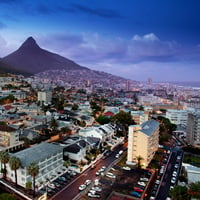South Africa
Coastal BeachesSouth Africa, officially the Republic of South Africa (RSA), is a country located at the southern tip of the African continent. It is marked by several distinct ecosystems and is known for its cultural diversity and rich history. The country is bordered by Namibia, Botswana, Zimbabwe, Mozambique, and Eswatini (Swaziland), and it entirely surrounds Lesotho. South Africa has three capital cities: Pretoria (executive), Bloemfontein (judicial), and Cape Town (legislative). Johannesburg is the largest city in terms of population and economic activity. The landscape of South Africa is varied and includes the Kalahari Desert, the flat and arid Karoo, fertile coastal plains, and the mountainous escarpments of the Drakensberg range. The country is renowned for its wildlife and conservation areas, such as the Kruger National Park, which is one of the world's most famous safari destinations. South Africa's history is deeply affected by the apartheid regime, which was a system of institutionalized racial segregation and discrimination that existed from 1948 until the early 1990s. The struggle against apartheid saw global attention and the eventual release of Nelson Mandela, who became the country's first black president in 1994, marking the beginning of a new era of democracy and reconciliation. Today, South Africa is a parliamentary republic with a mixed economy. It is considered an emerging market with a well-developed financial sector and is the second-largest economy in Africa. The country is a member of the United Nations, the G20, and BRICS (Brazil, Russia, India, China, and South Africa). Despite its economic strengths, South Africa faces challenges such as high unemployment rates, economic inequality, and issues related to crime and corruption. Culturally, South Africa is known for its diverse languages, with 11 official languages recognized by the constitution. English is commonly used in public and commercial life. The country is also famous for its music and arts, which reflect its multicultural heritage. South African cuisine is a fusion of indigenous African, European, and Asian influences, offering a rich gastronomic experience. Sports are a significant part of South African culture, with rugby, cricket, and soccer being the most popular. The country successfully hosted the 2010 FIFA World Cup, which was the first to be held on the African continent. South Africa's climate ranges from desert and semi-arid in the northwest to subtropical along the eastern coastline. The country's biodiversity is among the richest in the world, with numerous species of plants and animals unique to the region. Conservation efforts are in place to protect this natural heritage, including the Cape Floral Kingdom, which is one of the world's six floral kingdoms and is recognized as a UNESCO World Heritage Site.













